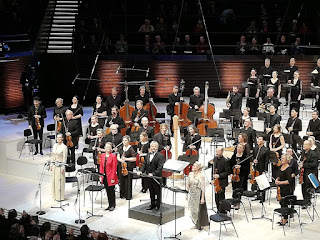Yllätyksekseni aikatauluni
sallikin työmatkani yhteydessä nähdä lyhyellä varoitusajalla Valkovenäjän
Kansallisoopperassa Georges Bizet’n oopperan Carmen. En ole suunnattomin
Carmenin ihailija, mutta ihan mukava oli pitkästä aikaa nähdä aivan
traditionaalinen ohjaus (Galina Galkovskaya) tästä maailmankuulusta tarinasta.
Carmenhan kertoo Don Josésta,
joka on pestautunut armeijaan ja ihastuu tulisesti tupakkatehtaan työntekijään
Carmeniin ja unohtaa kotikylän tytön Micaëlan. Carmen kuitenkin kyllästyy pian
Don Joséen ja rakastuu toreadori Escamilloon. Huonostihan siinä käy ja Don José
surmaa lopussa mustasukkaisuudessaan Carmenin.
Ooppera on täynnä
tuttuakin tutumpia säveliä, joka on sekä sen vahvuus että heikkous minun
silmissäni. Toisaalta on mukava kuulla mukaansatempaavia sävelmiä, mutta
toisaalta pidän kovasti teoksista, joita ei kuule ihan joka kulmalla.
Minskin versiossa oli
mukana myös suomalaisväriä, sillä puvustuksen oli suunnitellut Anna Kontek. Kun
ohjaus oli traditionaalinen, niin siltä oli turha odottaa mitään yllätyksiä,
joten esityksen visuaalisuus painoikin kaavassa sitä enemmän. Kontekin puvustus
oli traditionaalisen ja vapaamman tulkinnan rajalla ja värikkäitä asuja oli
kiva seurata.
Laulullisesti ilta ei
ollut ihan paras mahdollinen. Olen kerran esim. nähnyt Minskissä aivan loistavalla
miehityksellä Verdin Macbethin, mutta tämä Carmen ei kyllä vetänyt sille
vertoja. Valitettavasti pääosan laulaneella Oksana Yakushevichilla oli teknisiä
ongelmia ala- ja keskialueen kanssa. Ylä-äänet soivat kyllä kauniisti, mutta ei
se ihan riittänyt. Don José (Aleksey Mikutel) lämpeni vasta toisessa ja
kolmannessa näytöksessä parhaaseen vireeseensä. Vain Micaëlan roolin laulanut
Tatiana Gavrilova oli koko esityksen ajan tasaisen hyvä. Hänen aariansa Je dis
que rien ne m’épouvante oli suorastaan erinomainen.
Miksikään vuosisadan kokemukseksi
Carmenia ei siis voi kehua, mutta ihan viihdyttävä esitys pienistä puutteista
huolimatta oli, joten olin Minskin iltaani ihan tyytyväinen.






